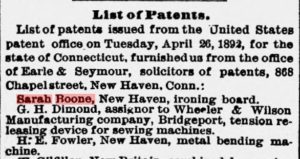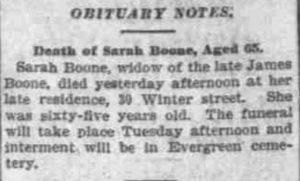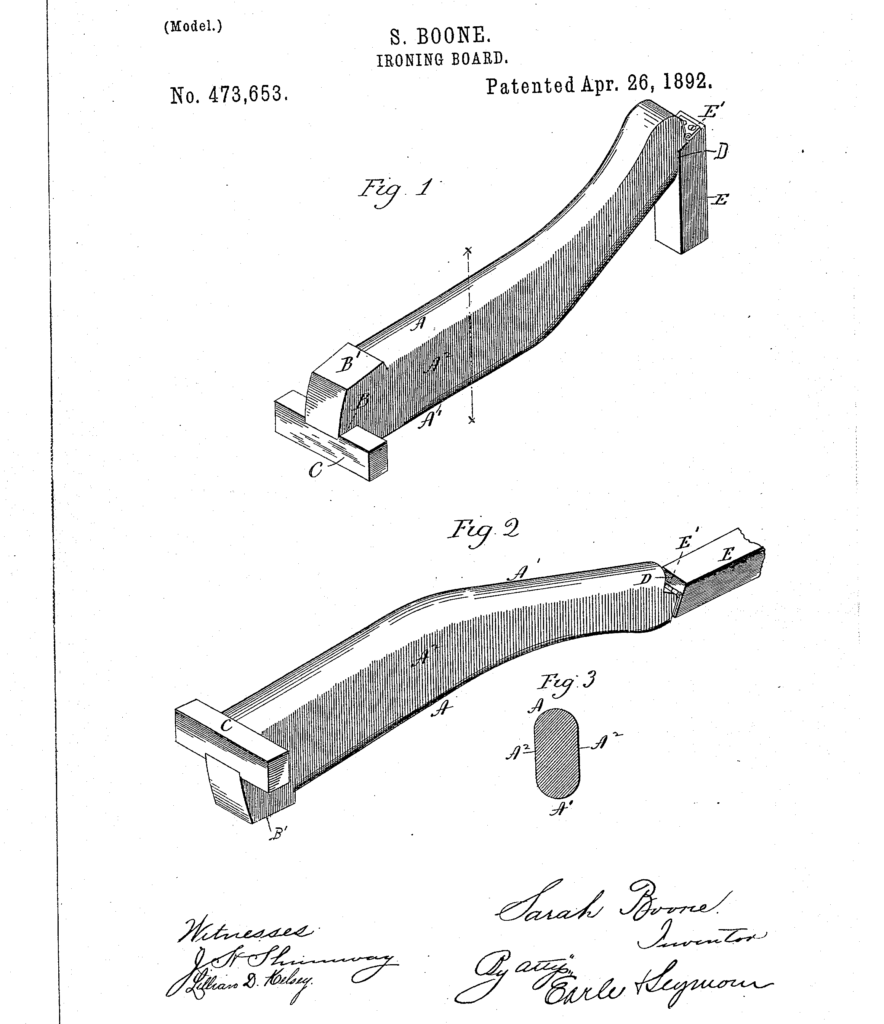By Edward T. Howe
Originally published March 22, 2022
On April 26, 1892, Sarah Boone of New Haven became the first Black woman in Connecticut to be awarded a patent—for an improvement in the use of an ironing board. Born Sarah Marshall in 1832 in Craven County, North Carolina, she allegedly escaped slavery when she married a free man, James Boone, in 1847. The couple migrated, by the mid-1850s, to New Haven where they raised eight children in a neighborhood near Yale University. James became a bricklayer and Sarah was a dressmaker. Aware that custom-fitted dresses made for corsets had a tiny waistline and sleeves that were full at the shoulders and tight at the wrists, Sarah realized the difficulty of ironing these 19th-century garments to eliminate wrinkles on both sides.
Sarah Boone’s Ironing Board Patent

Listing of Sarah Boone’s patent in New Haven’s Morning Journal and Courier, April 28, 1892 – Chronicling America, Library of Congress
Historically, the need for a flat surface for pressing clothes to eliminate wrinkles was not novel—in the 9th century, Viking women applied hot rocks to flattened whalebone. Over the ensuing centuries, the practice of using tabletops and pieces of wood between chairs—usually accompanied by some sort of padding—emerged in Europe and North America to facilitate the process. Although these unpatented versions were extant, it was not until the mid-19th century that the US Patent Office granted a patent for an ironing board. In 1858, William Vandenburg and James Murray of New York received three patents for an “ironing table” to press sleeves and pants. By 1866, Sarah Mort of Dayton, Ohio became the first woman to receive a patent for a “light and durable” ironing board for pressing ladies’ dresses, skirts, and bonnets. It could be extended and, when not in use, its press board could be removed to save space.
The US Patent Office granted hundreds of patents for ironing boards before Sarah Boone received her patent #473,653 in 1892. Specifically, her improvement involved a narrow reversible board with curved edges and a movable support to press the inside and outside seams of women’s dress sleeves and waist seams that made ironing easier. Men’s coat sleeves could also be pressed with a modification to the curved edges. It is unknown whether or not Boone benefitted financially from her patent.
Black American Women and Patents

Sarah Boone’s obituary in the New Haven Morning Journal and Courier, October 31, 1904 – Chronicling America, Library of Congress
When Sarah Boone received her 1892 patent, she became only the fourth known Black woman in the United States to hold a patent. On September 23, 1884, Judy W. Reed of Washington, D.C. became the first Black woman awarded a patent for her dough kneader and roller. Reed was followed by Sarah E. Goode of Ohio, who received a patent for a folding cabinet bed in 1885, and Miriam E. Benjamin of South Carolina, who received a patent for a gong and signal chair in 1888.
In Connecticut, Sarah Boone’s was one of a long line of patents issued to women, beginning with Mary D. Kies of South Killingly. Kies’ patent, issued on May 5, 1809, for weaving straw with silk and thread, was used to make hats. Unfortunately, the patent was lost when a fire destroyed the US Patent Office in 1836.
Sarah Boone died on October 29, 1904, of kidney disease (then called Bright’s disease); she is buried with her husband in Evergreen Cemetery in New Haven.
Edward T. Howe, Ph.D., is Professor of Economics, Emeritus, at Siena College near Albany, N.Y.









